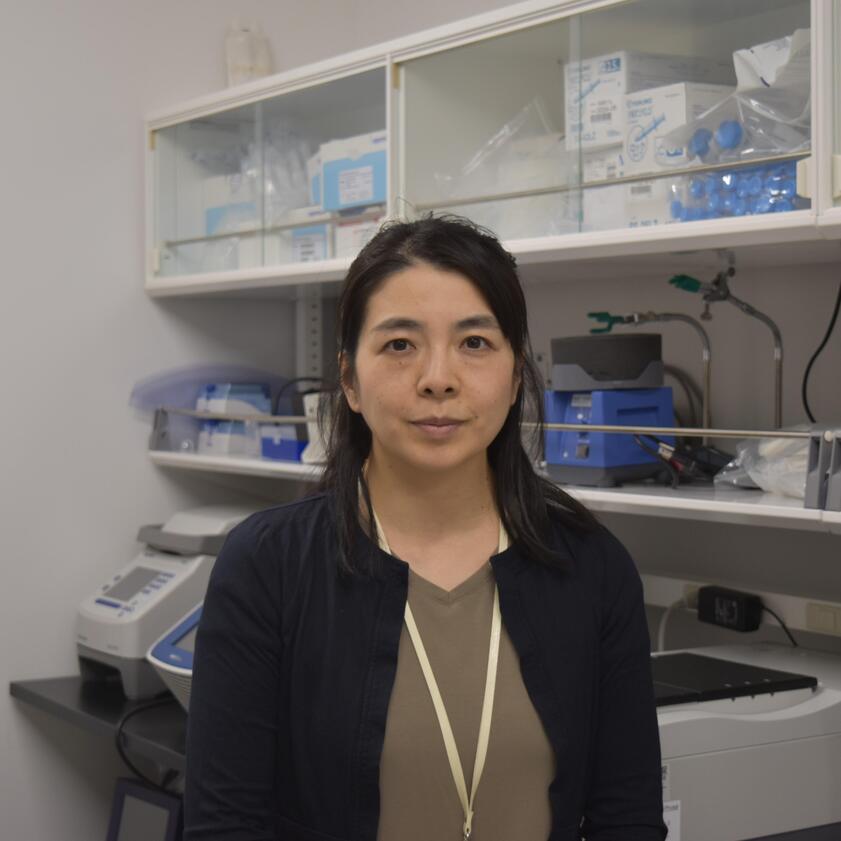Professor Ryuichiro Higashinaka

Researchers'
Associate Professor
Miho Tagawa
Research Center for Future Electronics Integration, Institute for Materials and Systems Research
Dr. Sang-jung Kang explains this in his book, "The Power of Worrying" (based on the values of Soseki Natsume and Weber). When I was in my doctoral program, I found this book when I felt I was going crazy from worrying so much. It made me feel better because it said that I could worry more, and that I needed to have the power to worry well. Since I have been able to view worrying in a positive light, I feel that I have developed a tolerance to accept any situation. It is impossible to have a life without worries.
We are conducting research to establish a method for freely assembling nanomaterials by applying the principle that biomolecules select and bind to their own partner molecules (molecular recognition) and build up a precise organization.
For example, metals and semiconductors exhibit novel physical properties when they are nanosized, which differ from those of visible bulk materials. Furthermore, depending on how they are assembled, the properties of the materials also change. I am working on creating various crystal structures of nanoparticles by binding DNA to the surface of these metal and semiconductor particles and assembling them using the molecular recognition ability of DNA.
In my master's program, I was conducting research in the field of surface physics. I loved research, but since there were no female faculty members or female seniors in my environment, I could not consider the option of going on to a doctoral program and becoming a researcher, so I got a job at an electrical manufacturer. I found an article about the self-assembly of biomolecules and nanotechnology in a scientific magazine I picked up at the company library. I was so impressed I decided to enter the doctoral program. In a laboratory that studies the interdisciplinary fields of physics and biotechnology, I was able to launch a research project that deals with DNA as a material for nanotechnology.
When I looked through a microscope that can see down to the nanoscale and saw crystals with nanoparticles lined up in a regular pattern!
Brilliance!? In reality, I am exhausted because I do not get enough sleep and I am pressed for time every day. That said, I think the reason I still find it fun is because I continue to pursue what I find interesting, just as I did when I was a child. I strongly hope that we can create a society where young women who want to pursue research can realize their dreams without giving up.
I am in a situation where I cannot find time to relieve my stress, so it remains unrelieved. I do not have time to be distracted, since I am raising children on my own and working as a university faculty member on weekdays. However, looking at my children's sleeping faces when I go to bed at night, I think, "Oh, I will do my best tomorrow!"
My second child was born in Nagoya, and raising two infants by myself was unimaginably difficult. At the time when my older child was playing and eating and my younger one was littering with food, I had to feed their dinner in the bathtub (laughs). Even if it got dirty, I would just rinse it off in the shower. I washed the dishes and took a bath as well. It was a great idea! I was impressed with myself.
We had also been known to wear the next day's clothes to bed at night. It may sound insane, but I could not have gotten over it by living a sensible life.
Now, we eat at the table properly and change our clothes in the morning. I think my children have grown up.
By using DNA, we are now able to fabricate nanostructures that cannot be produced by conventional methods. Thus, in the future, I would like to investigate and apply new physical properties arising from these nanostructures. In addition, I would like to explore not only the field of materials engineering but also that of fusion with medical engineering. I also aim to increase the number of junior female researchers.
Name: Miho Tagawa
Department: Research Center for Future Electronics Integration, Institute for Materials and Systems Research
Title: Associate Professor
Career history and hobbies:
Graduated from Musashi High School in Tokyo, and majored in physics and applied physics at the Graduate School of Science and Engineering, Waseda University for her undergraduate and graduate studies (especially the study of condensed matter physics (surface physics)). After working for an electrical manufacturer, she joined the University of Tokyo, obtaining her PhD in biophysics. She was a JST PRESTO researcher at Brookhaven National Laboratory in the US, where she pursued research in the interdisciplinary field of biotechnology and materials science. After assuming a position at Nagoya University, she spent her days juggling teaching and research while raising two children on her own.
Since the birth of her children, she has not had much time for hobbies, but she enjoys playing unicycle, iron bar, jumping rope, and playing the piano with her children.